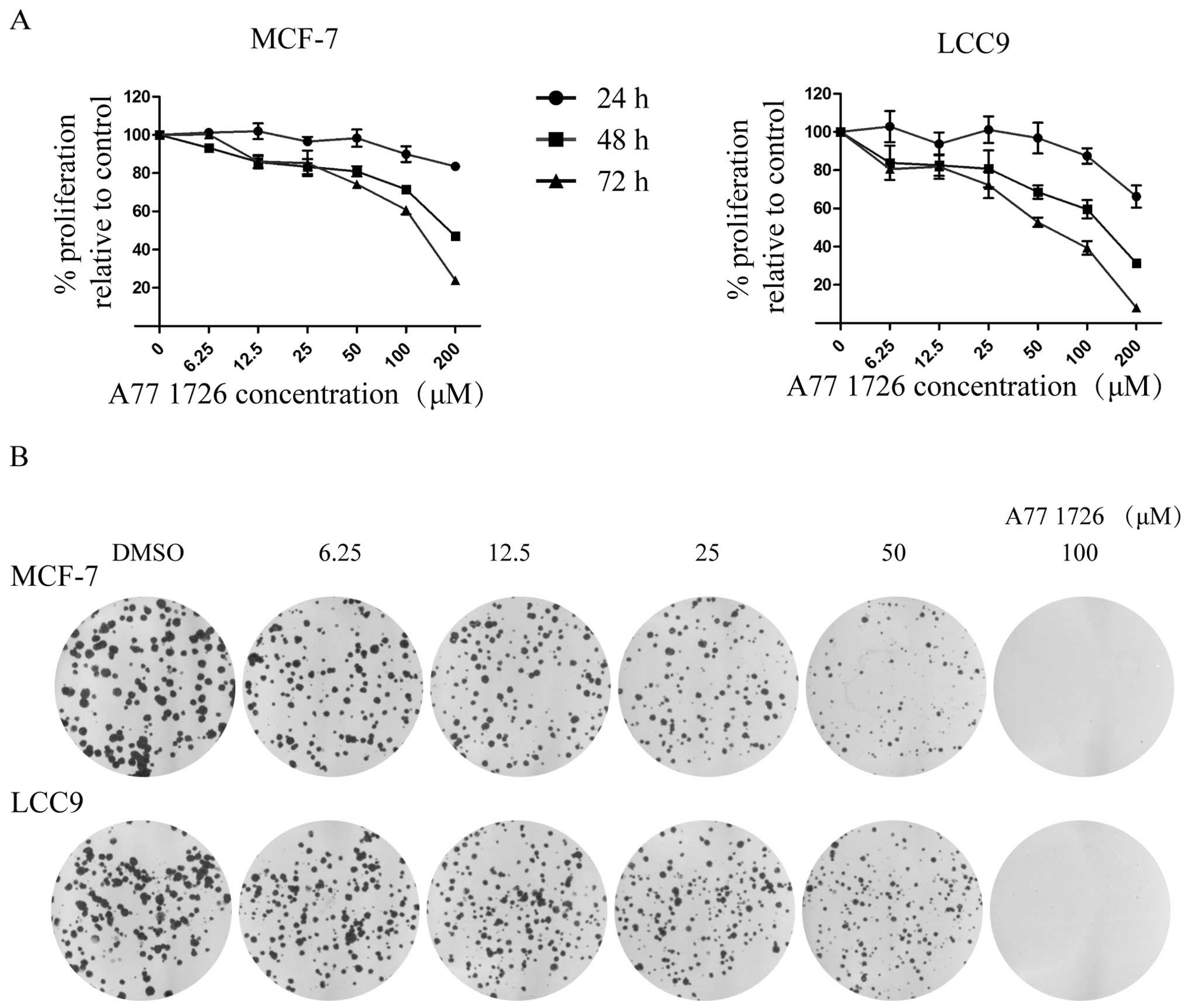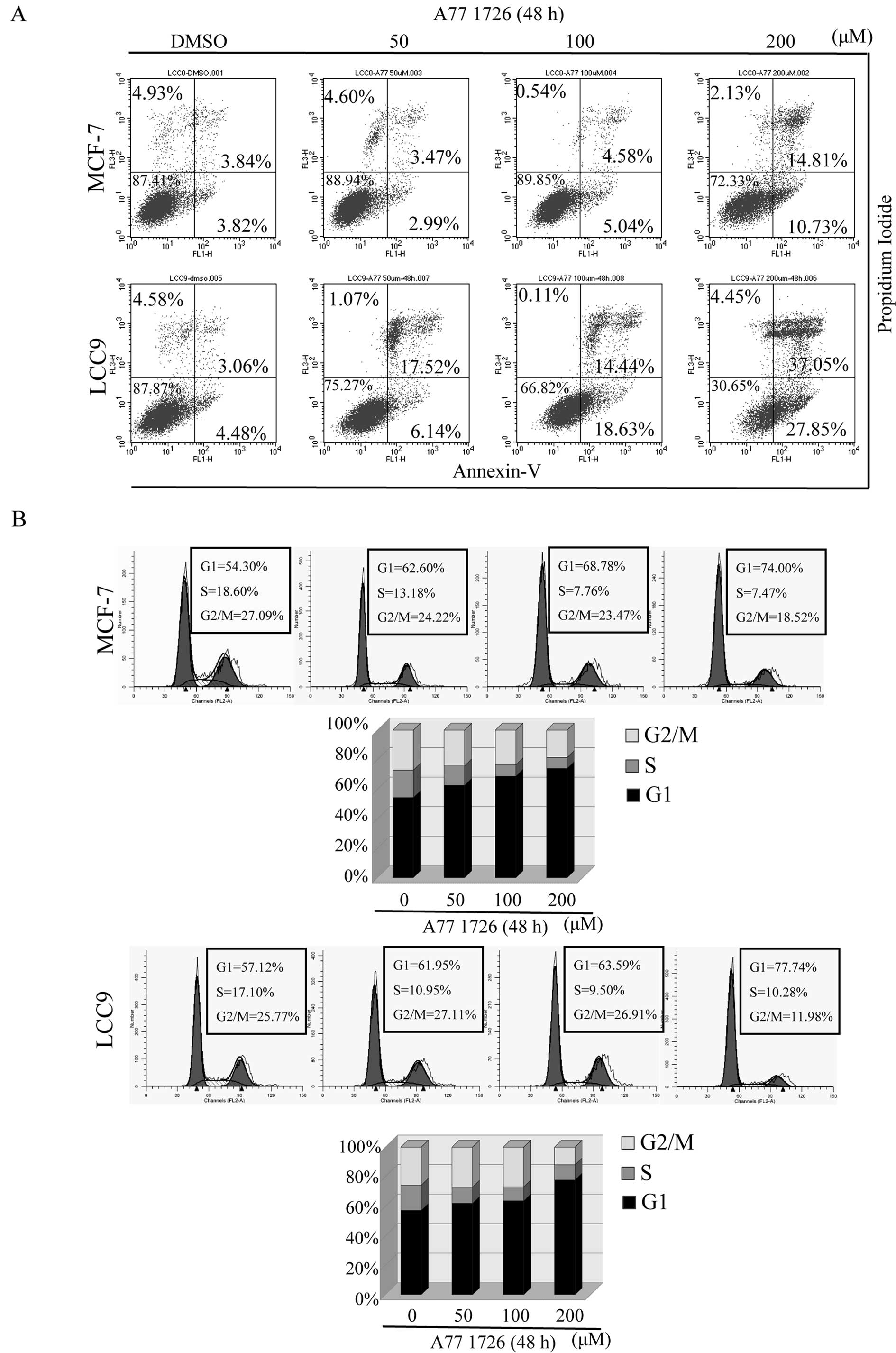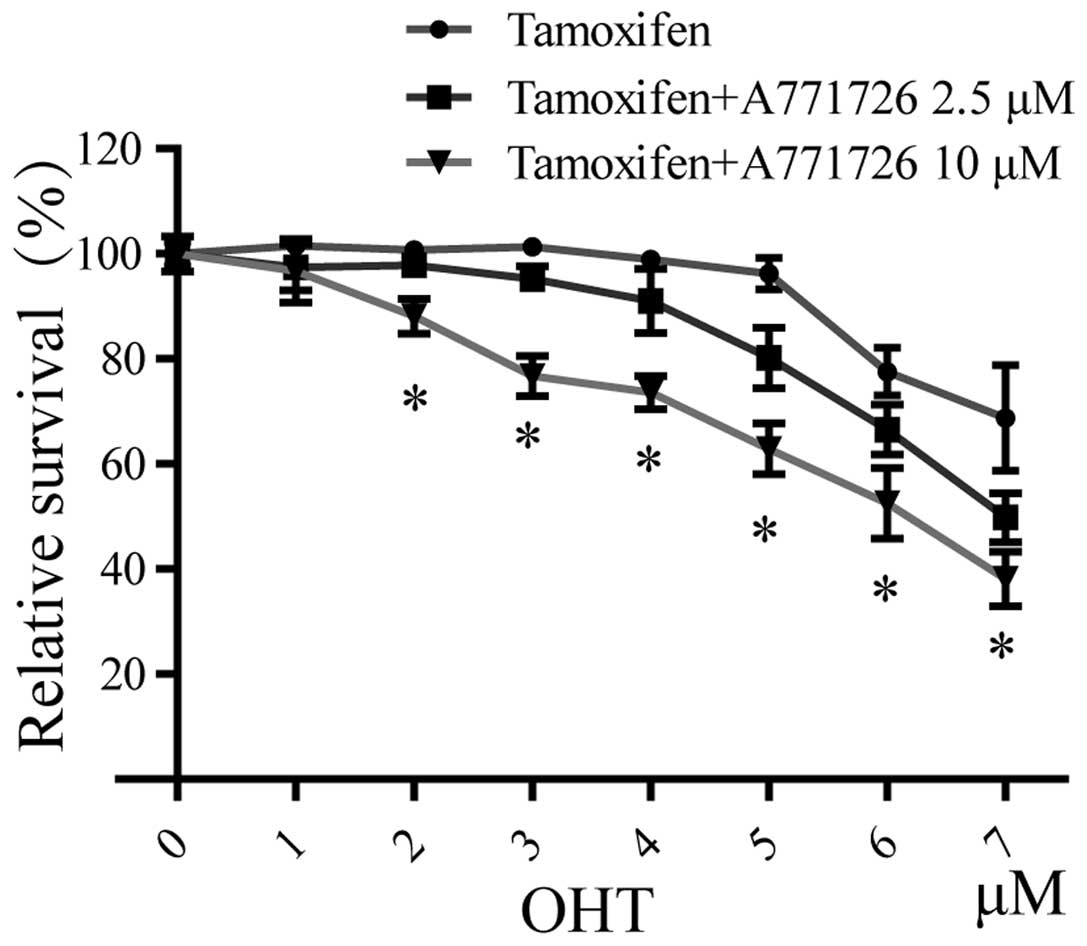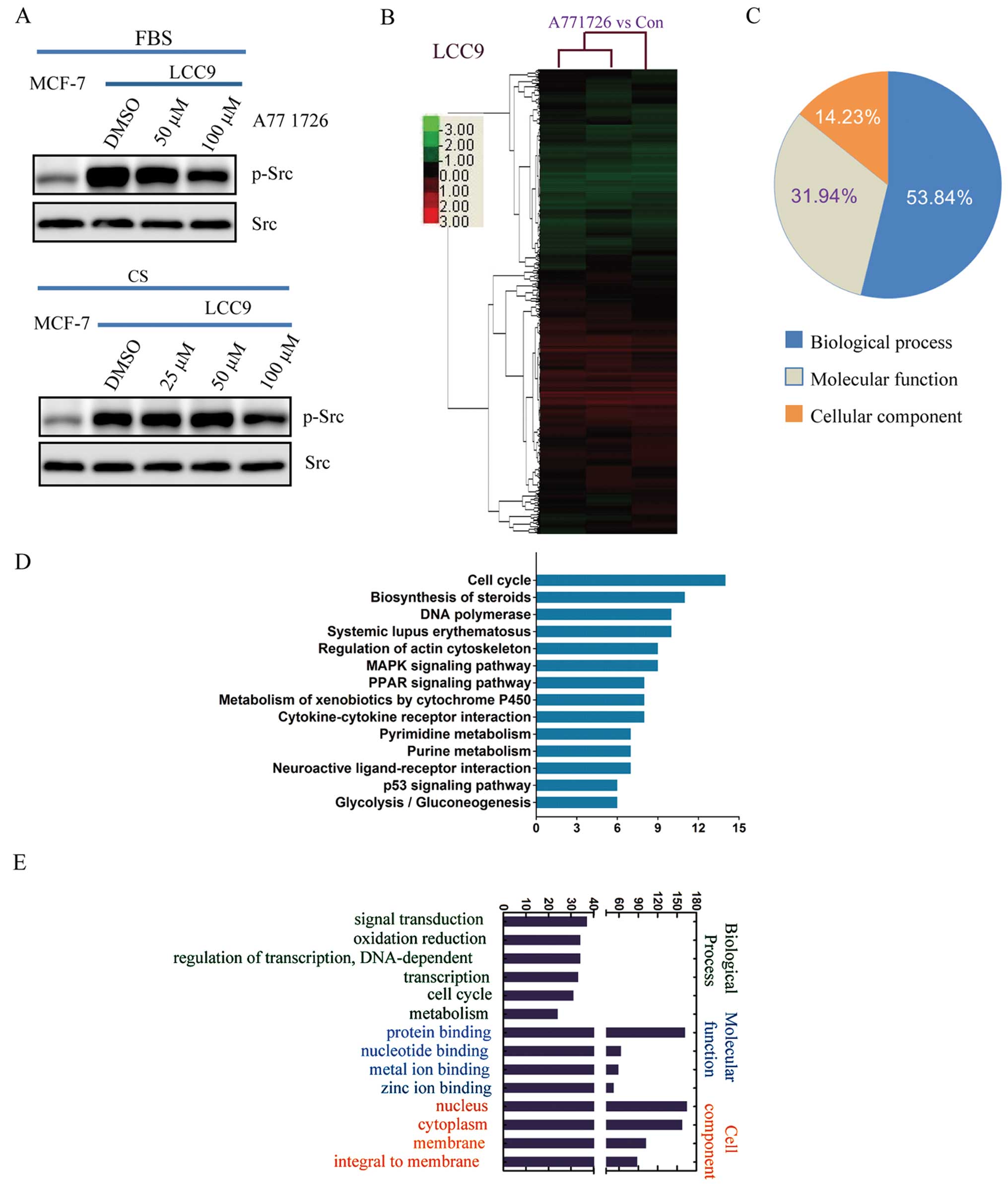|
1
|
Siegel R, Ma J, Zou Z and Jemal A: Cancer
statistics, 2014. CA Cancer J Clin. 64:9–29. 2014. View Article : Google Scholar
|
|
2
|
Chlebowski RT, Manson JE, Anderson GL, et
al: Estrogen plus progestin and breast cancer incidence and
mortality in the Women’s Health Initiative Observational Study. J
Natl Cancer Inst. 105:526–535. 2013.
|
|
3
|
McDonnell DP and Norris JD: Connections
and regulation of the human estrogen receptor. Science.
296:1642–1644. 2002. View Article : Google Scholar : PubMed/NCBI
|
|
4
|
Brouckaert O, Paridaens R, Floris G, Rakha
E, Osborne K and Neven P: A critical review why assessment of
steroid hormone receptors in breast cancer should be quantitative.
Ann Oncol. 24:47–53. 2013. View Article : Google Scholar : PubMed/NCBI
|
|
5
|
Pinkerton JV and Thomas S: Use of SERMs
for treatment in postmenopausal women. J Steroid Biochem Mol Biol.
142C:142–154. 2014. View Article : Google Scholar
|
|
6
|
Goncalves R, Ma C, Luo J, Suman V and
Ellis MJ: Use of neoadjuvant data to design adjuvant endocrine
therapy trials for breast cancer. Nat Rev Clin Oncol. 9:223–229.
2012. View Article : Google Scholar : PubMed/NCBI
|
|
7
|
Early Breast Cancer Trialists’
Collaborative Group (EBCTCG). Effects of chemotherapy and hormonal
therapy for early breast cancer on recurrence and 15-year survival:
an overview of the randomised trials. Lancet. 365:1687–1717.
2005.PubMed/NCBI
|
|
8
|
Ali R, Nicholas RS and Muraro PA: Drugs in
development for relapsing multiple sclerosis. Drugs. 73:625–650.
2013. View Article : Google Scholar : PubMed/NCBI
|
|
9
|
Oh J and O’Connor PW: Teriflunomide.
Neurol Clin Pract. 3:254–260. 2013. View Article : Google Scholar
|
|
10
|
Tallantyre E, Evangelou N and
Constantinescu CS: Spotlight on teriflunomide. Int MS J. 15:62–68.
2008.
|
|
11
|
Wiese MD, Rowland A, Polasek TM, Sorich MJ
and O’Doherty C: Pharmacokinetic evaluation of teriflunomide for
the treatment of multiple sclerosis. Expert Opin Drug Metab
Toxicol. 9:1025–1035. 2013. View Article : Google Scholar : PubMed/NCBI
|
|
12
|
Oh J and O’Connor PW: Safety,
tolerability, and efficacy of oral therapies for
relapsing-remitting multiple sclerosis. CNS Drugs. 27:591–609.
2013. View Article : Google Scholar : PubMed/NCBI
|
|
13
|
Oh J and O’Connor PW: An update of
teriflunomide for treatment of multiple sclerosis. Ther Clin Risk
Manag. 9:177–190. 2013.PubMed/NCBI
|
|
14
|
Zhu S, Yan X, Xiang Z, Ding HF and Cui H:
Leflunomide reduces proliferation and induces apoptosis in
neuroblastoma cells in vitro and in vivo. PLoS One. 8:e715552013.
View Article : Google Scholar : PubMed/NCBI
|
|
15
|
Hail N Jr, Chen P, Kepa JJ and Bushman LR:
Evidence supporting a role for dihydroorotate dehydrogenase,
bioenergetics, and p53 in selective teriflunomide-induced apoptosis
in transformed versus normal human keratinocytes. Apoptosis.
17:258–268. 2012. View Article : Google Scholar
|
|
16
|
Ringshausen I, Oelsner M, Bogner C,
Peschel C and Decker T: The immunomodulatory drug Leflunomide
inhibits cell cycle progression of B-CLL cells. Leukemia.
22:635–638. 2008. View Article : Google Scholar : PubMed/NCBI
|
|
17
|
Hail N Jr, Chen P and Bushman LR:
Teriflunomide (leflunomide) promotes cytostatic, antioxidant, and
apoptotic effects in transformed prostate epithelial cells:
evidence supporting a role for teriflunomide in prostate cancer
chemoprevention. Neoplasia. 12:464–475. 2010.
|
|
18
|
Dietrich S, Krämer OH, Hahn E, et al:
Leflunomide induces apoptosis in fludarabine-resistant and
clinically refractory CLL cells. Clin Cancer Res. 18:417–431. 2012.
View Article : Google Scholar : PubMed/NCBI
|
|
19
|
Baumann P, Mandl-Weber S, Völkl A, et al:
Dihydroorotate dehydrogenase inhibitor A771726 (leflunomide)
induces apoptosis and diminishes proliferation of multiple myeloma
cells. Mol Cancer Ther. 8:366–375. 2009. View Article : Google Scholar
|
|
20
|
Uckun FM: Rationally designed anti-mitotic
agents with pro-apoptotic activity. Curr Pharm Des. 7:1627–1639.
2001. View Article : Google Scholar : PubMed/NCBI
|
|
21
|
White RM, Cech J, Ratanasirintrawoot S, et
al: DHODH modulates transcriptional elongation in the neural crest
and melanoma. Nature. 471:518–522. 2011. View Article : Google Scholar : PubMed/NCBI
|
|
22
|
Somnay Y, Chen H and Kunnimalaiyaan M:
Synergistic effect of pasireotide and teriflunomide in carcinoids
in vitro. Neuroendocrinology. 97:183–192. 2013. View Article : Google Scholar : PubMed/NCBI
|
|
23
|
Musgrove EA and Sutherland RL: Biological
determinants of endocrine resistance in breast cancer. Nat Rev
Cancer. 9:631–643. 2009. View
Article : Google Scholar : PubMed/NCBI
|
|
24
|
Mukherjee S and Conrad SE: c-Myc
suppresses p21WAF1/CIP1 expression during estrogen
signaling and antiestrogen resistance in human breast cancer cells.
J Biol Chem. 280:17617–17625. 2005.PubMed/NCBI
|
|
25
|
Abukhdeir AM, Vitolo MI, Argani P, et al:
Tamoxifen-stimulated growth of breast cancer due to p21 loss. Proc
Natl Acad Sci USA. 105:288–293. 2008. View Article : Google Scholar : PubMed/NCBI
|
|
26
|
Riggins RB, Bouton AH, Liu MC and Clarke
R: Antiestrogens, aromatase inhibitors, and apoptosis in breast
cancer. Vitam Horm. 71:201–237. 2005. View Article : Google Scholar : PubMed/NCBI
|
|
27
|
Razandi M, Pedram A, Jordan VC, Fuqua S
and Levin ER: Tamoxifen regulates cell fate through mitochondrial
estrogen receptor beta in breast cancer. Oncogene. 32:3274–3285.
2013. View Article : Google Scholar : PubMed/NCBI
|
|
28
|
Martin LA and Dowsett M: BCL-2: a new
therapeutic target in estrogen receptor-positive breast cancer?
Cancer Cell. 24:7–9. 2013. View Article : Google Scholar : PubMed/NCBI
|
|
29
|
Nehra R, Riggins RB, Shajahan AN, Zwart A,
Crawford AC and Clarke R: BCL2 and CASP8 regulation by NF-κB
differentially affect mitochondrial function and cell fate in
antiestrogen-sensitive and -resistant breast cancer cells. FASEB J.
24:2040–2055. 2010.
|
|
30
|
Ning Y, Riggins RB, Mulla JE, Chung H,
Zwart A and Clarke R: IFNγ restores breast cancer sensitivity to
fulvestrant by regulating STAT1, IFN regulatory factor 1, NF-κB,
BCL2 family members, and signaling to caspase-dependent apoptosis.
Mol Cancer Ther. 9:1274–1285. 2010.
|
|
31
|
Schwartz JL, Shajahan AN and Clarke R: The
role of interferon regulatory factor-1 (IRF1) in overcoming
antiestrogen resistance in the treatment of breast cancer. Int J
Breast Cancer. 2011:9121022011. View Article : Google Scholar : PubMed/NCBI
|
|
32
|
Cook KL, Shajahan AN, Wärri A, Jin L,
Hilakivi-Clarke LA and Clarke R: Glucose-regulated protein 78
controls cross-talk between apoptosis and autophagy to determine
antiestrogen responsiveness. Cancer Res. 72:3337–3349. 2012.
View Article : Google Scholar : PubMed/NCBI
|
|
33
|
Geng Y and Sicinski P: Differences in
regulation and function of E-cyclins in human cancer cells. Cell
Cycle. 12:11652013. View
Article : Google Scholar : PubMed/NCBI
|
|
34
|
Caldon CE, Sergio CM, Kang J, et al:
Cyclin E2 overexpression is associated with endocrine resistance
but not insensitivity to CDK2 inhibition in human breast cancer
cells. Mol Cancer Ther. 11:1488–1499. 2012. View Article : Google Scholar : PubMed/NCBI
|
|
35
|
Miller TW, Balko JM, Fox EM, et al:
ERα-dependent E2F transcription can mediate resistance to estrogen
deprivation in human breast cancer. Cancer Discov. 1:338–351.
2011.
|
|
36
|
Lin JA, Fang SU, Su CL, et al: Silencing
glucose-regulated protein 78 induced renal cell carcinoma cell line
G1 cell-cycle arrest and resistance to conventional chemotherapy.
Urol Oncol. 32:29.e1–29.e11. 2014. View Article : Google Scholar : PubMed/NCBI
|
|
37
|
Jiang M, Huang O, Zhang X, et al: Curcumin
induces cell death and restores tamoxifen sensitivity in the
antiestrogen-resistant breast cancer cell lines MCF-7/LCC2 and
MCF-7/LCC9. Molecules. 18:701–720. 2013. View Article : Google Scholar : PubMed/NCBI
|
|
38
|
Hiscox S, Jordan NJ, Smith C, et al: Dual
targeting of Src and ER prevents acquired antihormone resistance in
breast cancer cells. Breast Cancer Res Treat. 115:57–67. 2009.
View Article : Google Scholar : PubMed/NCBI
|
|
39
|
Martinez-Outschoorn UE, Goldberg A, Lin Z,
et al: Anti-estrogen resistance in breast cancer is induced by the
tumor microenvironment and can be overcome by inhibiting
mitochondrial function in epithelial cancer cells. Cancer Biol
Ther. 12:924–938. 2011. View Article : Google Scholar
|


















